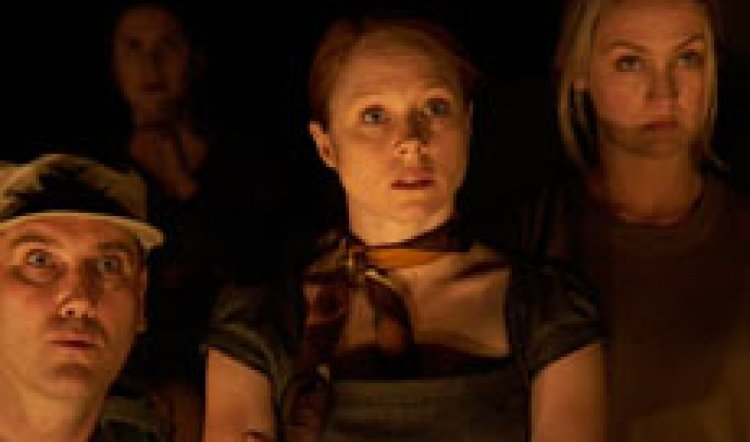
The Art of War
The Art of War, Wharf 1, Sydney Theatre Company, May 19-June 24; ph: (02) 9250 1777 or www.sydneytheatre.com.au
Two and a half centuries ago, someone who has come down to us as Sun Tzu wrote a philosophical and practical treatise - The Art of War on how to successfully conduct warfare. Example advice: "There is no instance of a country having benefited from prolonged warfare. Therefore in war let your great object be victory, not prolonged campaigns". It seems unlikely that George W. Bush has read Sun Tzu.
And Sun Tzu wrote: "All warfare is based on deception." It is this observation that begins Stephen Jeffreys' play, also titled The Art of War, and underpins each of the three interwoven stories he has devised to illustrate Sun Tzu's main points: from the opening moments when the ensemble of 12 begins, as a chorus, with direct quotes to the audience, it seems that every fridge magnet in the world is derived from the thoughts of Sun Tzu. This is not to denigrate The Art of War but rather, to pay homage to the untapped wells of profundity lurking on domestic fridges and office corkboards.
As adapted by English playwright Jeffreys - an imaginative commission by Robyn Nevin for the STC's resident Actors Company - The Art of War is clearly the Little Red Book for the latte and leveraged generation of Macquariebankers and technocrats. Where once western groove-meisters and mistresses toted their Thoughts of Chairman Mao and came back from Peking with desperately unflattering padded cotton suits and flat caps, now their sons and daughters jet off to Beijing to conduct corporate skirmishes in the world's most gigantic marketplace. According to Jeffreys' protagonists, however, the results in the early years of the 21st century are likely to be as inscrutable as they were when Mao Ze Dong was on the throne.
The other two story threads are interlinked: the broader examination of operations in Iraq from the twin perspectives of the grunt and the brass is also the setting for a very personal tale: of two people - a soldier and a journalist - whose lives and work are brought together by the conflict and unconsciously wrapped in the pages of Sun Tzu's instructions.
Director Annabel Arden (married to Jeffreys in real life and also imported for the production) has for once used the ensemble's actors as the real thing: a troupe. They march, swirl, twirl, chant and manoeuvre in visually and dramatically effective swarms and tableaux; breaking apart, regrouping and remaking themselves for the three stories in choreographed and visually arresting ways. On a stark cipher of a set (Robert Cousins, lit by Damien Cooper) there is a wide, shallow flight of steps and simple, railed upper walkway as their playpen. The effect is to foreground the text - not least because a screen regularly updates Sun Tzu's chapter headings - and the collective power of the group.
Piquantly, the individual performances Arden draws from the 12 are right out of Sun Tzu: the weak are rendered powerful and the powerful rendered weak. Or something like that. Thus the usually fine Peter Carroll's US general, circa early days of the Iraq war, is all over the place along with his accent. That he is uncomfortable in this role seems obvious from his monotonal bellowing delivery: as if he's got his medals caught in a tank trap. On the other hand, he is terrific - moving and funny - as the ageing Aussie company man whose caution is punished by the go-getter new young boss - a deliciously snaky and curiously familiar performance from Emily Russell - who, against his advice, go-gets herself and the company into serious strife.
Colin Moody goes from strength to strength - quite literally - as Garrett, the much decorated field hero whose ideals and doubts take a back seat when duty and ambition come calling. He jousts tenderly and savagely with Pamela Rabe as his journalist lover, Crystal. This isn't about the first flush of romance but rather, the heartaching reality of a perceived last chance for two feisty independents. It's a lovely thing to watch.

Hayley McElhinney and Amber McMahon each bring their own subtle, clever and outstanding individual talents to roles which are almost too tantalisingly fleeting, as they flick in and out of character and story. McMahon is all wired energy and menace, while McElhinney's comic sense and ability to twitch her nose and be hilarious make the two magnetic on stage. While Dan Spielman, Martin Blum and Eden Falk hold their ends up for the young men of the company.
Standing out from the pack, however, is Helen Thomson. A latecomer to the ensemble as a maternity leave replacement for Marta Dusseldorp, Thomson switches from Aussie corporate highflyer to US army private with astonishing facility. She is often cast as sharply glamorous women because - frankly - that's what she looks like. But her role as Hannah, a bewildered and eventually fearful American soldier from the working class South is out of her casting comfort zone and correspondingly memorable. If she hasn't read Love My Rifle More Than You by Kayla Williams she might be amazed to discover how accurate and moving her role and performance are.
Getting through Sun Tzu's manual for strife makes for a long if mostly absorbing night. Whether or not he was a Virgo is unknown, but he was madly ordered. Everything is gathered neatly under headings and in numbers - mainly five - so, the various fields of action take us through Belief in the Cause, the Hand of Nature, Terrain, the Commander, and Method and Discipline.
In the end however, The Art of War proves that as Sun Tzu wrote: all warfare is based on deception - whether it's corporate, business or armed conflict. And the epic nature of the play is equally deceptive: the images that linger are of intimate, personal moments - both funny and affecting - rather than the grand sweep of history, war and high finance.
If you don't come away from it having realised something profound about what has gone so horribly wrong in Iraq, why the Qantas take-over went pearshaped, what's ailing John Howard and, even, how to better negotiate your domestic situation, then you weren't listening. Or perhaps you were laughing or merely too absorbed in the drama to see the broader picture - Sun Tzu could offer advice for that.



